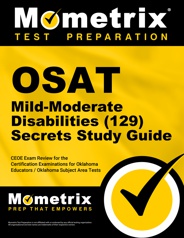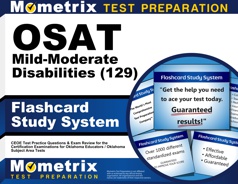The OSAT Mild-Moderate Disabilities exam is designed to test the knowledge of entry-level educators wanting to teach students with mild-to-moderate disabilities in the state of Oklahoma.
Click “Start Test” above to take a free OSAT Mild-Moderate Disabilities practice test, and check out our premium-quality OSAT test prep resources by clicking the links below!
Exam Outline
The OSAT Mild-Moderate Disabilities exam contains 80 selected-response questions and one constructed-response question, and you will be given a time limit of 4 hours.
The exam is split into five subareas.
I. Understanding Students with Mild/Moderate Disabilities (12%)
The questions in this subarea cover the following topics:
- Human development
- Factors that affect learning and development
- Various types of disabilities
II. Assessing Students and Developing IEPs and IFSPs (12%)
The questions in this subarea cover the following topics:
- Assessment instruments and procedures for evaluating the strengths and needs of students with mild/moderate disabilities
- Policies, principles, and procedures related to referral, eligibility, program planning, instruction, and placement of students with mild/moderate disabilities
III. Learning Across the Curriculum (45%)
The questions in this subarea cover the following topics:
- Practice for establishing positive and productive learning environments
- Methods for improving the language development and communication skills of students with mild/moderate disabilities
- Methods for the instruction of reading to students with mild/moderate disabilities
- Methods for the instruction of mathematics to students with mild/moderate disabilities
- Strategies for developing social skills
- Strategies for providing effective positive behavior interventions
- Methods for promoting the academic achievement and independent learning of students with mild/moderate disabilities
- Methods for promoting students’ acquisition of functional skills
- Principles, procedures, and strategies for promoting successful transitions for students with mild/moderate disabilities
IV. Working in a Collaborative Learning Community (16%)
The questions in this subarea cover the following topics:
- Effective collaboration and communication processes for working with members of the community and the school to enhance learning opportunities
- Strategies and practices for promoting effective school-home collaborations
- Strategies and practices for the encouragement of families’ involvement in their children’s education
- The history and philosophy of special education
- Key issues, trends, professional roles and responsibilities, and ethical and legal issues relevant to special education
V. Case Study—Analysis of Data to Identify and Effectively Address Student Needs (15%)
This subarea contains the single constructed-response question. You will be asked to write a short analysis of a given case study. Your analysis should identify a student’s strength and needs and include a strategy for monitoring student progress.
Check Out Mometrix's OSAT Mild-Moderate Disabilities (129) Study Guide
Get practice questions, video tutorials, and detailed study lessons
Get Your Study Guide
Exam Registration
To register for the OSAT Mild-Moderate Disabilities exam, you must create an online NES account via their website. Once your account has been created, you can use it to register for the exam and schedule an exam date. When you register, you will need to pay the $118 exam fee.
Test Day
In-person Testing
On testing day, you should arrive at the testing center about 30 minutes earlier than the scheduled appointment. This will give you the needed time to complete the check-in process. When you arrive, you will be asked to sign in and present a valid form of photo ID to the proctor. If you fail to bring your ID, you will not be able to take the exam.
Personal items are not allowed in the testing room, so they must be stored in a secure locker outside the testing area. This includes your cell phone, wallet, keys, and accessories.
Just before the exam starts, you will be given a brief tutorial on the testing system.
Remote Testing
On the day of the exam, you should log into your testing account between 15 and 30 minutes prior to the scheduled appointment time. The proctor will ask you to show a valid form of government-issued photo ID, and they will ask you to scan your surroundings using your webcam.
Once your exam begins, you cannot leave the webcam view, take breaks, or talk to yourself. Your focus must be on the exam, and other people must be out of your testing space while you take the exam.
Should the proctor determine that you are not following the guidelines for remote proctoring, your exam can be canceled, and your registration fees forfeited.
How the Exam is Scored
Your OSAT score is determined by taking your raw score (the number of questions you answered correctly) and converting it to a scaled score. To pass, you will need to get a minimum scaled score of 240.
You will receive your official score report within four weeks after testing.
Check Out Mometrix's OSAT Mild-Moderate Disabilities (129) Flashcards
Get complex subjects broken down into easily understandable concepts
Get Your Flashcards
FAQs
Q
How many questions are on the OSAT Mild-Moderate Disabilities exam?
A
There are 81 questions on this exam.
Q
How long is the OSAT Mild-Moderate Disabilities exam?
A
The time limit for this exam is 4 hours.
Q
What is the passing score for the OSAT Mild-Moderate Disabilities exam?
A
To pass the exam, you must achieve a scaled score of at least 240.
Q
How much does the OSAT Mild-Moderate Disabilities exam cost?
A
The examination fee is $118.
